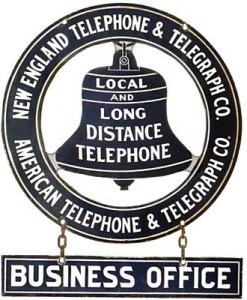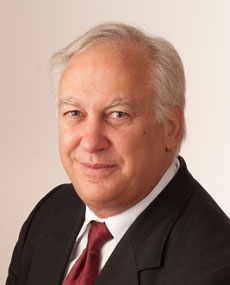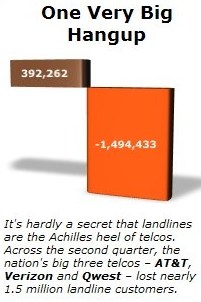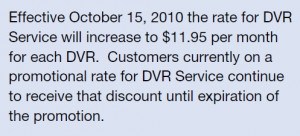 Telephone companies will lose up to half of their broadband market share if they insist on sticking with DSL technology to deliver Internet access, according to a new report from Credit Suisse analyst Stefan Anninger.
Telephone companies will lose up to half of their broadband market share if they insist on sticking with DSL technology to deliver Internet access, according to a new report from Credit Suisse analyst Stefan Anninger.
Anninger predicts DSL will increasingly be seen as the “dial-up” service of the 2010s, as demand for more broadband speed moves beyond what most phone companies are willing or able to provide. Credit Suisse’s analysis says DSL accounts sold in the United States top out at an average speed of just 4Mbps, while consumers are increasingly seeking out service at speeds of at least 7Mbps. The higher speeds are necessary to support high quality online video and the ability for multiple users in a household to share a connection without encountering speed slowdowns.
A lack of investment by landline providers to keep up with cable broadband speeds will prove costly to phone companies, according to Anninger. He believes a growing number of Americans understand cable and fiber-based broadband deliver the highest speeds, and consumers are increasingly dropping DSL for cable and fiber competitors. Any investments now may be a case of “too little, too late,” especially if they only incrementally improve DSL speeds.
Anninger says providers may be able to offer up to 18Mbps in five years by deploying ADSL 2+ or VDSL technology, but by that time cable operators will be providing speeds up to 200Mbps, and many municipal providers will have gigabit speeds available.
The impact on phone company broadband market share will prove bleak for phone companies in all but the most rural areas, Anninger predicts. He says by 2015, cable companies will have secured 56 percent of the market (up by 2 percent from today), phone companies will drop from 30 percent to just 15 percent, Verizon FiOS, AT&T U-verse, and wireless broadband will each control around 7 percent of the market, with the remainder split among municipal fiber, satellite, and other technologies.
Anninger is also pessimistic about wireless broadband being a wired broadband replacement in the next five years.
 A Credit Suisse online survey of 1,000 consumers in August found that less than half would consider going wireless only. The reasons? It’s too slow, too expensive and most plans have Internet Overcharging schemes like usage caps and speed throttles.
A Credit Suisse online survey of 1,000 consumers in August found that less than half would consider going wireless only. The reasons? It’s too slow, too expensive and most plans have Internet Overcharging schemes like usage caps and speed throttles.
Although cable companies are on track to be the big winners in broadband market share, still have one giant hurdle to overcome — a lousy image. Just 36 percent of cable customers say they are “very satisfied” with their local provider. More than 60% of FiOS and U-verse’s broadband customers said they are “very satisfied” with the services these advanced telephone company networks provide. Consumer Reports has regularly awarded top honors to Verizon FiOS for the last several years.
Independent phone companies and smaller cable operators routinely score at the bottom, typically because they are relying on outdated technology to supply service.
This makes the marketplace ripe for disaffected consumers to jump to an alternative provider. Unfortunately, as most Americans face a duopoly of the cable company they hate and the phone company that doesn’t deliver the services they want, there is no place for them to go.
Anninger also predicts the risk of broadband reform by reclassifying broadband under Title II at the Federal Communications Commission is now “minimal.” That suggests Net Neutrality enforcement at the FCC is not a priority. The Credit Suisse analyst says if action hasn’t been taken by winter or spring of next year, it’s a safe bet the Commission will never re-assert its authority.


 Subscribe
Subscribe








